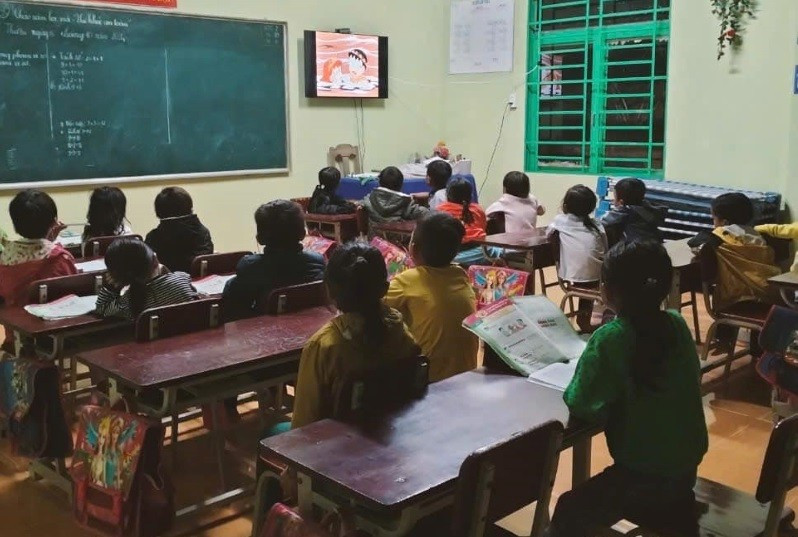Only by building a local teaching force can we fundamentally and sustainably solve the problem of teachers in mountainous areas...

Ms. Tra Thi Thu, a teacher at Tra Tap Ethnic Boarding Primary School (Nam Tra My, Quang Nam ), organizes boarding meals for students at the village school branch with support from benefactors. Photo: Provided by the school.
The Quang Nam Provincial People's Committee plans to submit a proposal to the upcoming Provincial People's Council meeting for consideration, aiming to issue a resolution on support policies for teachers working in high-altitude mountainous districts. It is expected that Quang Nam will provide support ranging from 50 to 100 million VND and a monthly living allowance of 1.2 to 1.8 million VND per person to attract teachers to teach in these highland areas.
A difficult region… with all sorts of difficulties.
Since Tra Mai commune completed its new rural development program and no longer receives the allowances applicable to particularly disadvantaged communes, almost every year Tra Mai Secondary School (Nam Tra My, Quang Nam) has had cases of teachers requesting transfers to schools in disadvantaged areas.
Mr. Nguyen Khac Diep, Principal of Tra Mai Secondary School, explained: "For newly recruited teachers, when teaching in Tra Mai, they will no longer receive the 30% attraction allowance, nor the initial 10-month subsidy. Instead, they will only receive 35% of the classroom allowance, just like teachers teaching in the lowlands."
For example, Ms. CTN, a Literature teacher, expressed her desire to transfer from Tra Mai Secondary School to Tra Tap Ethnic Boarding Secondary School. Her monthly salary increased by 5-6 million VND compared to when she taught in Tra Mai commune.
Besides the "reverse flow" from schools in Tra Mai commune to other disadvantaged communes in Nam Tra My district, this mountainous district also has another flow: teachers who took the civil service exam in other districts, after a period of time, request transfers to more favorable areas. Many teachers, after 5 years of teaching in highland schools, when their regional allowance support period ends, seek ways to move back to the lowlands.
Localities in the plains of Quang Nam province still lack preschool and primary school teachers. Therefore, simply passing the civil servant recruitment exam will exempt these teachers from the probationary period. The time spent contributing to social insurance while working in the education sector is counted towards salary increases, so almost all teachers are guaranteed benefits when they pass the civil servant exam in another locality, rather than having to "start from scratch".
From 2019 to the present, approximately 530 teachers have transferred out of the high-altitude mountainous districts of Quang Nam province. In addition, nearly 100 tenured teachers currently teaching in schools in these mountainous areas have resigned.
Mr. Nguyen Van Nhi, Deputy Head of the Education and Training Department of Nam Tra My district, said that many teachers, even those with ten years of experience and permanent positions, still leave the profession. "Most teachers working in mountainous areas are not from the local area, so they often come from two or three different places."
Teachers cannot teach or take on additional jobs to supplement their income. Therefore, even with a high teaching coefficient, after the 5-year period of receiving the attraction allowance ends, teachers in mountainous areas have to be very resourceful to make ends meet. Meanwhile, job opportunities in their lowland areas are abundant, the income is higher, and living conditions are better,” Mr. Nhi analyzed.

Mr. Nguyen Van Nhan, a teacher at Tra Don Ethnic Boarding Primary School (Nam Tra My, Quang Nam), provides free evening tutoring at the village school branch. (Photo: Provided by the interviewee)
Finding ways to "retain" teachers.
According to the draft Resolution on support policies for teachers working in mountainous districts of Quang Nam province for the period 2025-2026, the initial support for teachers teaching in communes in Zone III or particularly difficult villages will be 100 million VND/person. For communes in Zone II, the support will be 75 million VND/person. For communes in Zone I, the support will be 50 million VND/person. The mountainous districts implementing the policy according to the draft resolution include Nam Tra My, Bac Tra My, Dong Giang, Nam Giang, Tay Giang, and Phuoc Son.
In addition to the one-time support, teachers recruited under the recruitment program in the 2025-2026 period are expected to receive a living allowance of 1.8 million VND/person/month for civil servants working in communes in Zone III or particularly disadvantaged villages. The allowance will be 1.5 million VND/person/month for civil servants working in communes in Zone II and 1.2 million VND for those in communes in Zone I.
Mr. Vo Dang Chin, Principal of Tra Nam Ethnic Boarding Primary and Secondary School, said that the proposals in the draft resolution show a priority for teachers working in disadvantaged areas.
However, according to Mr. Chin, this is not the key point in solving the teacher shortage problem in schools here. “Besides salary and benefits such as salary increases, living expense support, housing, and allowances for teachers in remote areas, in the long term, appropriate recruitment policies are needed. These should prioritize training and recruiting local children as teachers, because they understand the culture, customs, and have a strong connection to their homeland.”
It is necessary to create a local teacher pool by facilitating opportunities for students in mountainous areas to study pedagogy through targeted training policies with accompanying support such as tuition fee waivers and scholarships.
"After graduation, they return to serve their local communities," suggested Mr. Chin, adding: "Currently, some mountainous areas of Quang Nam, including Nam Tra My, still have a large number of graduates from other fields who are unemployed. These are students from ethnic minority groups right in the local area."
These children receive boarding school education from a young age and basic training. If they are sent for further training in primary and preschool education, their chances of being recruited as civil servants are very high, and this is also the most fundamental solution to help maintain a stable teaching force in the locality.
According to Ms. Tran Thi Bich Thu, Head of the Culture and Social Affairs Committee of the Quang Nam Provincial People's Council, in addition to continuing to recruit additional teachers, relevant agencies need to survey the number and training fields suitable to the needs and forecast the teacher shortage.
From there, select students with good and excellent academic performance at ethnic boarding schools in the province to develop a teacher training plan using a task-based approach, and implement policies to support tuition fees and living expenses according to Government Decree No. 116/2020. Only by building a local teaching force can the fundamental and long-term problem of teachers in mountainous areas be solved.
Source: https://danviet.vn/de-xuat-chinh-sach-thu-hut-giao-vien-vung-kho-de-nuoc-chay-ve-cho-trung-20241127070609676.htm















































































































Comment (0)